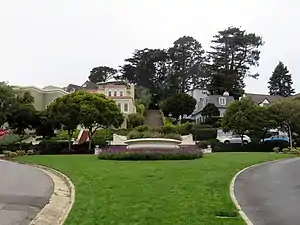Forest Hill, San Francisco
Forest Hill is a neighborhood in San Francisco, California. Forest Hill is one of eight master-planned residence parks in San Francisco.[4] Forest Hill is located near the middle of the City of San Francisco, southeast of the Inner Sunset and northeast of West Portal. Boundaries are roughly Seventh Avenue/Laguna Honda Boulevard to the north and east, Taraval Street to the south, and 14th Avenue to the west.
Forest Hill | |
|---|---|
 Entrance to Forest Hill from Dewey Boulevard | |
 Forest Hill Location within Central San Francisco | |
| Coordinates: 37.748°N 122.463°W | |
| Government | |
| • Supervisor | Myrna Melgar |
| • Assemblymember | Phil Ting (D)[1] |
| • State Senator | Scott Wiener (D)[1] |
| • U.S. House | Nancy Pelosi (D)[2] |
| Area | |
| • Total | 0.93 km2 (0.359 sq mi) |
| • Land | 0.93 km2 (0.359 sq mi) |
| Population (2021)[3] | |
| • Total | 2,800 |
| • Density | 3,345/km2 (8,663/sq mi) |
| ZIP Code | 94116 |
| Area code | Area code 415 |
| Website | https://foresthill-association.com/ |
The area south of Dewey Boulevard is known as Laguna Honda or the Forest Hill Extension. The name Laguna Honda means "deep lagoon" in Spanish and presumably refers to the Laguna Honda Reservoir at the intersection of Laguna Honda Boulevard and Clarendon Avenue.[5]
History
Forest Hill was purchased by a private firm from the heirs of Adolph Sutro. Ground digging to develop the neighborhood began in 1912. Forest Hill was consciously developed to be and openly marketed as a racially exclusive, white-only enclave for economic elites. In the words of promoters who pitched the new neighborhood to potential residents in 1913: "In Forest Hill no property will be sold to Africans or Orientals, and every man who builds a house must build one that is a credit to the property. Forest Hill is only for those people who will build at least $4,000 houses. When a man purchases a home site in Forest Hill he can feel assured that his investment, his home and his family are protected from unsightly buildings and undesirable neighbors."[6]
The streets in Forest Hill were originally built for horse and carriage, making them unusually wide. These streets in Forest Hill did not conform to San Francisco's standards regarding width and grade, and therefore were not initially approved nor maintained by the City until 1978.[7] Landscape architect Mark Daniels developed the master plan for Forest Hill.[8] Several homes and the neighborhood clubhouse were designed by California Arts and Crafts Movement architect Bernard Maybeck.[9] Harold G. Stoner also contributed to the architecture of the area, designing several houses as part of projects for Lang Realty.[10][11]
References
- "Statewide Database". UC Regents. Archived from the original on February 1, 2015. Retrieved December 29, 2014.
- "California's 11th Congressional District - Representatives & District Map". Civic Impulse, LLC.
- "Forest Hill neighborhood in San Francisco, California (CA), 94116". City-Data.com.
- "Researching Residence Parks". SF West History. 10 (4). Oct–Dec 2014.
- Kamiya, Gary. "A Walking Tour of San Francisco's Hidden Waters". San Francisco Magazine. Modern Luxury. Retrieved 2014-03-28.
- "Along The Color Line". The Crisis. August 1913. p. 169.
- "Forest Hill". OutsideLands.org. Western Neighborhoods Project. Retrieved 19 March 2022.
- "Mark Daniels: Landscape Architect of Forest Hill, Sea Cliff and More". Western Neighborhoods Project, Outsidelands.org, April 2, 2003.
- McCoy, Esther (1960). Five California Architects. New York: Reinhold Publishing Corporation. p. 6. ASIN B000I3Z52W.
- "Mt. Davidson » Harold G. Stoner". Mt. Davidson. Retrieved 2021-04-12.
- "Streetwise: Forest Hill". OutsideLands.org. Western Neighborhoods Project. Retrieved 2021-04-12.
External links
![]() Media related to Forest Hill, San Francisco at Wikimedia Commons
Media related to Forest Hill, San Francisco at Wikimedia Commons
.svg.png.webp)